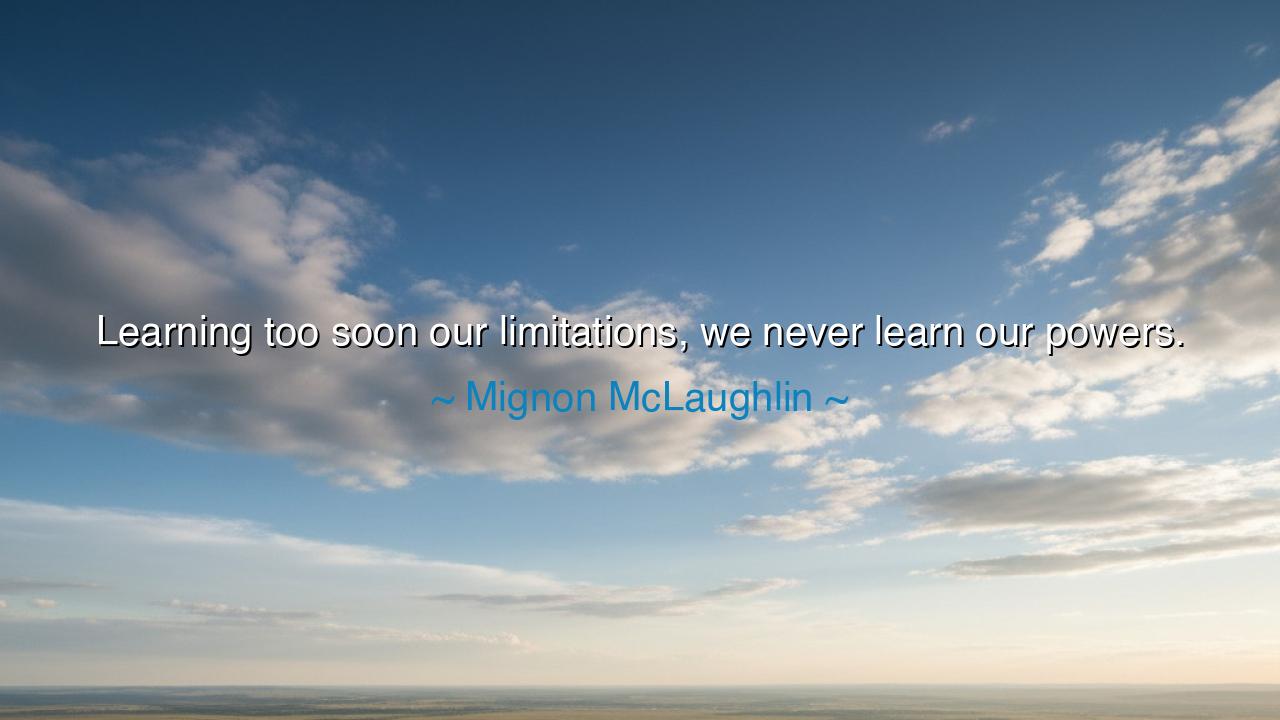
Learning too soon our limitations, we never learn our powers.






When Mignon McLaughlin wrote, “Learning too soon our limitations, we never learn our powers,” she was speaking of one of the most tragic errors of human life — the surrender of potential before it has even been tested. Her words, delicate yet piercing, are a warning against the quiet defeat that comes when we are taught, too early, to accept what we cannot do, instead of discovering what we can. Beneath this simple sentence lies an ancient and eternal truth: that the greatest chains that bind us are not made of iron or circumstance, but of belief — the belief that we are smaller than we truly are.
In the ancient style of wisdom, this quote might have been carved into the walls of a temple as both a caution and a calling. To “learn our limitations too soon” is to let the voice of doubt take root before the seed of courage has a chance to grow. It is to be told, as a child, “you are not strong enough, not smart enough, not destined enough,” and to carry that shadow through life. McLaughlin understood the fragility of the human spirit — how easily it can be shaped by early judgments, by fear, by the opinions of others. But she also knew the power that lies dormant within us, waiting for the spark of belief to awaken it. For the soul that is never tested never truly knows its own strength.
The origin of McLaughlin’s insight lies in her life as a writer and observer of the human condition. Known for her sharp wit and emotional intelligence, she explored the contradictions and quiet struggles of modern life. In this quote, she distilled a truth that poets and philosophers have echoed for centuries: that self-discovery comes not from obedience to boundaries, but from the courage to challenge them. The world teaches us to fit into molds, to fear failure, to measure ourselves by the limits of others. Yet McLaughlin’s wisdom is a rebellion against that — a call to rediscover the untamed potential that lies within each human heart.
The great Leonardo da Vinci once said, “Iron rusts from disuse.” So too does the spirit when it is never exercised. Imagine if da Vinci had accepted his limitations — told himself that he was only a painter, and not an inventor, scientist, or engineer. The Renaissance itself would have lost one of its brightest lights. Or consider Helen Keller, who, struck blind and deaf as a child, was told by the world that she would never learn, never communicate, never live fully. Yet she refused to accept those boundaries, and in defying them, became a beacon of human perseverance. In both, we see McLaughlin’s truth made flesh: those who accept limitation too early never discover their power; those who challenge it become legends.
Yet this wisdom is not about reckless denial of reality — it is about balance. To know our limits is necessary; to be enslaved by them is fatal. The ancients spoke of moderation, but also of heroism — the act of stretching beyond the known. To learn one’s limits too soon is to mistake the temporary struggle for the eternal truth. Many people, after a few failures, accept defeat as destiny. They do not realize that power reveals itself only after persistence, that every talent, like a muscle, must be tested through pain and time. McLaughlin’s words remind us that growth begins where comfort ends, and that every limitation, when faced with courage, becomes a doorway to strength.
There is something deeply emotional in this truth — something both painful and liberating. For it tells us that much of what holds us back was learned, not born. We inherited our fears, absorbed our doubts, memorized our own inadequacy as if it were fact. But just as it was learned, it can be unlearned. The human soul is a living flame, not a fixed form. If we stop defining ourselves by our limits, we begin to discover our powers — our ability to create, to endure, to rise. Every person carries within them an ocean of untapped potential, but only those who dare to swim beyond the shore ever feel its depth.
So, the lesson of McLaughlin’s quote is clear and eternal: do not accept your limits before you have tested your strength. Refuse to let early defeat define your destiny. When doubt whispers, let curiosity answer; when fear says “you can’t,” let effort respond, “I will try.” Push against the boundaries you have been given, not to prove the world wrong, but to reveal to yourself how vast you truly are. For every time you challenge your limits, you move closer to your power — that radiant, indestructible force that was within you all along.
And thus, remember this, dear seeker: your power lies not in what you have already achieved, but in what you have yet to attempt. The world will always try to teach you your limits — but only you can teach yourself your strength. Walk boldly into the unknown, for it is there, beyond the edge of what you believe possible, that your truest self waits — patient, powerful, and free.






AAdministratorAdministrator
Welcome, honored guests. Please leave a comment, we will respond soon